#even with the themes and symbolism in the larger story as a whole
Explore tagged Tumblr posts
Text
Save me Hannibal x The Phantom Of The Opera au.
I could go in depth about this
#no listen#there is so much overlap#why have I seen no one talk about this#even with the themes and symbolism in the larger story as a whole#I need to yap#hannibal tv show#Hannibal#the phantom of the opera
8 notes
·
View notes
Text
Brienne and Femininity (and Masculinity)
I’ve been musing how one of the most important topics in Brienne's storyline is femininity, and even though her story isn't finished, we can fairly see what some of her major themes are around this—particularly, how performing or failing at performing femininity affects her both internally and externally.
Often I see people pointing out that, in spite of all of Brienne’s traditionally masculine ways—her clothes, her skill set, her body shape, to name a few—she does not fully reject femininity. That she likes little cute animals and fairy tales and wears dresses, and is shy and blushes frequently. This is an important point because, very often, fantasy settings made the assumption that a woman can only be taken seriously if she goes beyond “her womanhood” and acts and thinks “like a man,” as opposed to other girls who are too busy mending or wanting romance. Brienne challenges those tendencies that GRRM saw in his contemporaries. Things have changed a lot since (hello The Locked Tomb, for example), but you can still see where he is working from, and how many of the aspects of Brienne's story still resonate with more modern audiences because, well, sexism hasn't stopped existing. It's also important because the larger asoiaf and got fandoms often refuse to see this side of her, reducing her to a walking sword or a cardboard cut out of a pushover.
Now, my main issue here is that I feel several interpretations of Brienne have now gone on the other direction, and focus so much on Brienne PERFORMING traditional femininity—wearing luxurious dresses, using make up, accepting lavishing gifts, or wondering if she can be desired, for example—that we've gone sometimes on the opposite direction. I feel like many times we’re afraid or do not know how to approach characterizing her as someone who rejects aspects of femininity without making her into another “not like other girls” stereotype.
My two cents on the matter is that if we focus too much in what Brienne can't but "wants" to perform, we forget that she is, in fact, gladly rejecting some common impositions of femininity in her society.
Beginning with swordplay at a young age, for example, she was very glad to ditch a more traditional education in order to learn how to fight the way we know men are taught in asoiaf/got. She is also explicitly more comfortable in men's clothes. We all like the scene where Jaime makes an effort to give her a dress and she appreciates it, but we don't even find out what happened to the dress, because, presumably, the dress itself is not THAT important, at least not as much as the fact Jaime gave her gifts as a form of appreciation. Dresses have been used in Brienne's past to mock her (the event with the bear being the most recent one), and the important part is that Jaime is the only one who has given her one without that ulterior motive. The point of the scene is that where everyone undermines and underestimates her, he is acting the opposite way. We’re seeing how the relationship between them has evolved and that he is doing his best to mend what has happened and what he has done. She is given a dress and a sword as symbols that someone else in the story is beginning to appreciate her for all she is.
Beyond that, we even get details on the old shield Brienne got at Harrenhal, but not a word about the dress. Brienne explicitly doesn't really like being in dresses, she prefers mail and breeches, and feels more at ease in them than anything else. This is not her hating dresses because she is above them. I can’t remember well but as far as we know it’s just her preference: I don’t recall her saying she hates dresses, just that she prefers trousers. She must have been wearing dresses her whole life! It’s not likely she is unused to them. But we do know the act of being given a dress is important in Brienne’s story. The problem is not that they can’t make dresses for her, the problem is that everyone who forces her to wear a dress wants to signal how lacking she is as a woman, trying to fit her in a box too small for her real shape and then mocking her because she doesn’t meet their standard. The problem is they want to make her uncomfortable and they want to humiliate her, because she dares to exist in a way that doesn’t conform to patriarchal ideals. And the problem is that she likes to wear trousers and mail. She likes to wear masculine clothes, and they want her to be very aware of how much they disapprove.
And we also hear a great deal about marrying and having children out of duty. There's a certain loss she feels there because she believes that, at that point, all those missed opportunities will never present themselves again. All her life, she grew up with a dichotomy that dictated that the chance of having a family or children was through duty or none at all, because she is her father’s heir and—they kept telling her—nobody would want an ugly, masculine, temperamental girl as a wife. They could only want her for the money she brought. The point of the story is that, once again, failing the standards of femininity has forced her into a mentality where she thinks she can’t be loved because nobody would like who and what she is. But even then, even with that thorn in her mind, she still feels relieved she didn't have to perform these particular duties. The only thing she’s sad about is that she thinks she's missed any chance at having a family at all and will never know what that might be like. She doesn’t actively want babies or even to be married. She is still young, and at least to me, she seems to view these things in hypothetical rather than explicit goals or wants. She thinks that, at 20, there is no opportunity for her to experience these things because of how her society works. It’s the lack of choice that she mourns, down the line. But she rejects that particularly role that femininity imposes on her now. She didn’t want it, and she is happy it didn’t go through. She literally fought an old man to prove how much she didn’t want those impositions.
All this is interesting to me because Brienne also sort of thinks of herself as her father's son as well as her father's daughter. It almost slips her mouth once or twice. She is aware, I think, that many times the differences between a son and a daughter boil down not really to gender but to the sort of duty they perform. And she wants to do the sorts of things sons do, too. Men regularly learned to fight and wore the clothes she liked best and used hard-earned skills in a way she wanted to use them. There are layers to this (we’ll get to that in a bit) but she is, I think, very aware of her masculinity, and, if left to her own devices, she seems comfortable in it. The problem is she is NOT left to her own devices.
Most of Brienne's self doubt comes from outside forces. As a woman, they underestimate her. As a woman, they think she is stupid. As a gender non-conforming woman, every jape uttered goes directly to her womanhood. As a woman, if she looks the way she does and dresses the way she does and fights the way she does, when she expresses any vulnerable emotion, any shred of “femininity,” she is mocked for it. She likes dancing and beautiful things and pretty boys but a woman as masculine as she is is not the sort of person who gets to express those preferences without judgment from those around her.
The point is Brienne’s world wants her miserable either way: being unable to be a woman the way they demand of her, because she is too much “like a man” for it, or being unable to be a man, because she is too much a woman for that. The point is she can’t win regardless of what she does. Because that’s how sexism works.
But Brienne’s story is, I think, one about choices. The thing is that the world makes it harder for her, but she shouldn't have to be one thing or the other. She shouldn’t have to be defined by one or the other. If she wants to fight in the mud and smell roses and wear chain-mail and talk to charming men, she should be able to choose all of those things. I think it’s easy to focus too much in what aspects of femininity Brienne likes or dislikes instead of looking at what the story is proposing, which is to look at what Brienne,as a person, likes or dislikes. What she wants. Her parallel story to Jaime is about how the world will always try to put folks in boxes, especially those who, for some reason or another, do not easily fit in those boxes. The question is not “what feminine/masculine parts of Brienne is she happy performing” but rather “what does Brienne want, and why does she feel like she cannot get it and doesn't dare ask.”
This is also what drives her to servitude. There’s a phrase out there that says that if you don’t think you can be liked, you try to become useful, so at least there’s a reason to keep you around. It’s heartbreaking to see how Brienne’s vision of herself has been so skewed by the emotional abuse, parental neglect, and bullying she’s experienced since a young age. She doesn’t think anyone will grow close to her, so at least she can be close to people by serving them. She wants to put her skills to use, she wants to find a place where she fits, where she can be more herself, but she isn’t sure what that looks like or how to find it. She’s still searching, and learning many things on the way.
And Brienne is still very young. We can see her confidence growing and her worldview challenged and she is beginning to see the realities of herself and of the world around her through various trials by fire. Misogyny makes her feel incomplete, but we know the things she trusts about herself while simultaneously seeing the way she constantly doubts others. How she can't never express all of herself without constant judgment or mockery.
I feel like yes, the fact Brienne doesn't reject all traditional femininity is really important to her themes, but by extension, it's as important that shedoes reject some of those traditional expressions of femininity. What she is truly rejecting is imposition, not femininity. What she truly needs to embrace is freedom, not masculinity. She's making her own vows, breaking her own promises, going through her own mistakes. She is learning the hard way. Agency in a world of limited choices is one of Brienne's main themes too. There are moral issues that go deep within her story as well as examinations of the effects of war and the struggle to find authenticity and connection in a community that refuses to acknowledge yours, a community drenched in pretense and lost in performance.
And I think it’s easy to get too caught up in her wanting to be a girlfriend or a mother or wearing a dress that we bypass the whole conversation around why that matters at all. I feel like Brienne's success isn't going to come from her fully embracing all her feminine traits or fully accepting all her masculine traits but from being able, down the line, to be exactly who she is.
#i was looking at my drafts and here are some scrambled ideas I had that I wanted to release so I've tried to make them more organized#brienne of tarth#asoiaf
187 notes
·
View notes
Text
I’m still going through a second read, but I have a few more thoughts about Sunrise that I want to share:
Lenore Dove just didn’t work for me as a character. She felt more like an archetype than an actual person—this idealized, almost mythical girl that we only ever see through Haymitch’s eyes. We don’t get a real sense of who she is outside of how he perceives her, and that made her feel hollow to me. And I don’t think this is because it’s from Haymitch’s pov; Peeta, Gale and Lucy Gray exist to prove otherwise. I think the problem is that Suzanne tried to give her too much—she’s too quirky, too rebellious, too special. She’s not just different; she’s the different girl ™️, the one who stands apart from everyone else in a way that feels forced rather than natural. Again, more of an archetype than a character with depth.
And then there’s all the symbolism layered onto her character, which just felt too much. Instead of weaving these themes into the story organically, it felt like Suzanne was trying to construct this larger-than-life figure, but it just didn’t land. She came across as a Lucy Gray 2.0, but without the small, nuanced details that made Lucy Gray feel like a real person.
On top of that, her love story with Haymitch lacked everything that made the other romances in the series work. It didn’t have the quiet charm and slow build of Katniss and Peeta, or the emotional complexity of Katniss and Gale, or even the charged tension of Coriolanus and Lucy Gray. It was just… there, where Suzanne tells us that this is how it is, instead of showing us how it is. And as much as I love a well-written love story, this is one of those cases where I genuinely think Haymitch’s arc—and the book as a whole—would have been better without her.
Her presence felt unnecessary, especially considering that other characters could have carried the themes and symbolism she represents in a much more natural, less heavy-handed way. And if the whole point was that Haymitch never moves on from her, I wished she had been a better developed character then. The idea that he spends his entire life pining over a 16-year-old girlfriend, especially when her character didn’t earn the level of impact we’re supposed to accept she had? It just doesn’t work for me.
I don’t hate her. But I find that she hinders the narrative, and the story suffers because of it.
27 notes
·
View notes
Text
i still think it's interesting that the core, running theme of "hunting makes a monster" is first introduced in 1x02, which is pretty solidly dean's introduction episode. it's interesting because it's rather sam's monstrosity via his destiny which is the larger plot of the show and is thus explored more explicitly.
when it comes to dean, the theme is applied more subtly, not as an afterthought but an undercurrent, essential to the story unraveling but never taking a center stage. the show spends so much time yelling at us about sam's monstrosity that dean's comes off as more of, hm, a feeling of wrongness. i guess it comes back to the idea that sam has a monster inside him (demon blood), but dean is inherently monstrous. i think the show expounds this well: the marked way dean is set apart from sam as a "natural" hunter, even to the point that a whole episode is devoted to proving that he was born to be one (4x17), the resigned understanding that he can never quit hunting, the ways he differs from sam when hunting itself becomes the thematic conflict.
not to say sam's relationship to monstrosity is misleading or wrong, but rather that i think it's clever how dean is constructed to fill the role without taking a spotlight on it. the monstrosity of hunting is the foundation of the show, not the plot of it, and it's interesting to see that theme woven into the subcurrents of the story, always present in its deuteragonist and therefore always present in the building blocks of the world kripke invented, and yet not distracting as to make it a plot in itself. it gets a focus especially through gordon as an allegory for dean's fate, but rarely is it the plot, you know?
and anyway all this to say, it becomes a well-planned microcosm for the larger story kripke tells: as sam pursues hunting, it becomes shorthand for him pursuing (unknowingly) the fate he believes he's fighting against. dean creates the mold that sam falls into so that once he begins his relentless pursuit of monsters, we understand it to simultaneously be a relentless pursuit of monstrosity itself.
and it also becomes a clever parallel for the earlier demon war and the later apocalypse in how those themes unravel, becoming clear warnings that angels and all others who orchestrate the fates of sam and dean are to be distrusted, that salvation from heaven is no more holy than the flames of hell, that there is no winning in the war against monsters because every pawn is one, himself. so it says a lot about what the world is and how one can break free of The Cycles: sam and dean can only escape their fates by turning to each other, and this is represented in that they can only escape their own monstrosity by leaving the life.
and at the end of all of this is john, who functions as the ultimate symbol of monstrosity both through his narrative role and through his allegorical relationship with azazel—mirrors of each other, imparting their monstrous wisdom upon their children, and ultimately corrupting the family. such is life.
#supernatural#whateverrrrrrrr#the subtlety of it is the most fascinating part of it to me#i appreciate that subtlety because it lets the developments happen naturally in the background#and once you see them it's truly horrifying#shrugs#spn posting#.txt
13 notes
·
View notes
Text
Musings on Custodes: The Power of Names
One of my favourite headcanons for Custodes is all about what their naming conventions should be.
And you can consider the title a clickbait, since I don't actually mean their famous practice of names acquisition, but rather the way they name things around them, particularly - their various tools and weapons.
It is a whole thing with Custodes that they don’t really see themselves as a part of the Imperium - not just in terms of command structure, but in the general sense of “we want nothing to do with that thing and only care about what happens to it in very roundabout ways”. Which, bear in mind, is not a moral stance on their part - they are all about autocratic empires, it’s just that this one isn’t being currently ruled over by their specialest guy in the whole universe. And yet they still have to regularly interact with its variously washed masses, so it’s not hard to imagine that they would want to differentiate themselves from them as much as possible in the process.
Which presents a bit of a challenge, since their whole visual aesthetic is very much the Imperium’s turned up to 11 - nothing is more abundant in imperial iconography than gold and eagles.
But you know what isn’t?
Memory.
Cultural memory specifically. Custodes' relatively unique access to the cultural knowledge of humanity's distant past has always been an important, if not an extremely prominent part of their lore. They know a lot about Terra's ancient history, culture, philosophy, music, nature! Surely, like every elite in history in similar position, they would use this knowledge to separate themselves from those without it. And names are quite an efficient way of doing that!
In fact, they already kind of do this. You can't tell me that an imperial naval commander ordering their fighters to clear a path for an Orion dropship knows who (or even what) the fuck "Orion" is. The same can be basically said for all current Custodes vehicles: Ares, Pallas, Coronus, Calladius, Galatus, Achillus, Telemon - to most of the Imperium's population in 42nd millennium those would probably be somewhat recognizable High Gothic-related words at best, and complete nonsense at worst.
But those are, on meta level, just expressions of Custodes' hellenistic theme. And in-universe those names were probably given out a long time ago, for different reasons and likely not even by custodians themselves. So I would love to see this realized in more ways. Through references to other mythologies, other types stories, other areas of human knowledge.
Like, say - Custodes are clearly well suited to a bird of prey motif, what's with striking suddenly and precisely from the sky and all the regal associations. But everybody and their mother within the Imperium apparently knows what an eagle is, even though I doubt that any of the Terra's bird species to bear the name actually survived into the grimdark future. Dawneagle Jetbike my ass - you'll only have yourself to blame when a crate full of them gets sent to a Space Marine chapter because it sounds exactly like something they would have (not to mention the fact that there is like an 80% chance that "Dawn Eagles" are already a chapter somewhere out there). But surely there are other predator birds to use when naming stuff? Ones that would actually be way more meaningful for you, because you are basically the only ones left to know that they ever existed? "Osprey" and "Kestrel" sound cool! "Buzzard" maybe not so much, but it is unique! And uniqueness is an actual requirement if an important part of your identity revolves around knowing things that everyone else has forgotten.
It would be cool, I think, if appreciation of the value of this lost knowledge was played up as a larger part of the Custodes' deal. A lot of cultural symbols familiar to us nowadays seem to have survived into the distant future by being so deeply embedded in our ideas of power and proficiency - all the more reason to appreciate that which fell by the wayside. "Yeah, this simple word is just a name of an animal or an item that small groups of humans in an unimaginably distant past used to associate with something - but I know that, and you don't, and that makes it meaningful to me" sort of deal. Mundane that becomes mystical by the virtue of having been lost.
So, I guess what I am saying is that I would love to see Custodes rock up to a CSM ship named something like Covenant of Despair, which just finished crunching through the Imperial battleship Litany of Defiance, and proceeding to absolutely wreck their shit from aboard the assault cruiser Frogmouth .
#warhammer 40000#adeptus custodes#musings on custodes#no really though#do you think an average imperial citizen can imagine an eagle as like#an actual bird
15 notes
·
View notes
Note
GRRM masterfully intertwines their Targaryen women’s personal struggles with the larger theme of intergenerational trauma, particularly around women of power being either exalted or demonized, depending on how they fit into the agendas of men. It’s not just about individual characters like Rhaenyra or Daenerys—it’s about how their very existence, and the existence of their foremothers, reflects cycles of trauma that have been passed down within the Targaryen family for generations.
The idea of Targaryen exceptionalism—the notion that they are “gods above men”—adds a fascinating layer to this. Women like Rhaena, Alysanne, and Aerea are taught their whole lives that they are extraordinary, able to command dragons and defy the usual limitations of society. But the harsh reality is that this exceptionalism only extends so far, and when it comes to gender, they are still bound by the oppressive rules of patriarchy. As you pointed out, no matter how powerful a Targaryen woman might be, she is still subjected to the same expectations and limitations that society places on all women. This is especially apparent when we see how they are denied the privileges that their male relatives take for granted—whether it’s being sidelined in succession, forced into marriages, or vilified for their ambition.
Rhaena Targaryen’s story is particularly telling in this regard. She had all the makings of a powerful Targaryen: she rode Dreamfyre, was the first grandchild of Aegon the Conqueror, and should have had autonomy over her own fate. She was a person with some of the highest potential for greatness in ASOIAF. Yet, despite her dragon and her lineage, she was still forced into a marriage with Maegor and eventually pushed aside in favor of Jaehaerys. Her gender determined her fate more than her birthright, and that is a tragedy we see repeated throughout Targaryen history. If Rhaena had been born male, her story would have been entirely different, but as a woman, her power was constrained and her choices were dictated by men.
Alysanne Targaryen, while often viewed as one of the more empowered Targaryen women, also faced limits despite her influence. She advocated for reforms that benefited women, like the abolition of the First Night and the protection of women’s inheritance rights. Yet, even she could not sway Jaehaerys when it came to critical decisions, like the succession. Her daughters, despite being princesses of House Targaryen, were subject to the same patriarchal expectations of marriage and childbirth, and Alysanne’s heartbreak over their fates highlights how even the most powerful women cannot escape the trauma of being female in a patriarchal society.
Aerea Targaryen, perhaps the most tragic of the three, serves as an even starker reminder of this. Her decision to seize Balerion and fly away was an act of defiance, an attempt to claim the power and freedom denied to her as a young woman. But the horrific consequences of her journey—her body physically ravaged upon her return—symbolize the ultimate cost of challenging the gendered structures that confine her. Aerea’s fate, like those of so many Targaryen women, reflects the danger of trying to break free from the roles that society, and even her family, imposes on her. Despite her bloodline and the power of her dragon, she was still a victim of the same forces that diminished her foremothers.
These patterns of trauma and repression don’t just affect the individual women—they become part of the larger narrative that defines House Targaryen. The lives of women like Rhaena, Alysanne, and Aerea contribute to a broader cultural mythos where female power is either exalted or demonized depending on how it aligns with male interests. Rhaenyra’s claim to the throne is undermined by the propaganda that paints her as unfit simply because she is a woman, while Daenerys’s story is filled with echoes of these earlier women who sought power only to be punished for it. The same patriarchy that diminished Rhaena, Alysanne, and Aerea laid the foundation for the later conflicts that would tear the Targaryen family apart, from the Dance of the Dragons to the eventual fall of the dynasty.
Ultimately, GRRM’s depiction of Targaryen women is a powerful critique of how patriarchal societies simultaneously elevate and destroy women of power. For all their greatness, these women are still trapped within cycles of trauma, repression, and violence that transcend their personal struggles and become integral to the history of their house. This cycle continues right up to Daenerys, who, despite being House Targaryen’s last hope, is subjected to the same forces that destroyed her ancestors.
The Targaryen women embody this tension between exceptionalism and oppression, and their stories are a reminder that even the most powerful bloodline in Westeros cannot escape the brutal realities of gendered violence and systemic trauma.
Take notes, all!
#the targaryens#westerosi society#asoiaf asks to me#westerosi history#westerosi women#targaryen women#asoiaf fav posts#agot#asoiaf#asoiaf writing#fire and blood writing#fire and blood
25 notes
·
View notes
Text
“Similar innuendos—originally devised as a marketing ploy, perhaps—would eventually become part of the larger theme of redemption and love. As one critic observed: “As the series progressed, the sly jokes and innuendo turned into loving glances and a physical closeness that was increasingly intimate in nature, beyond the kinds of interactions one sees between ‘just friends’”
Yes, well, you can thank Lucy and Renee for that because they realized themselves that the “wink wink nudge nudge” approach wasn’t WLW representation and they sought to put that right by lessening all of that and instead focused more so on the deep friendship and a relationship that was beyond words and beyond what was subtext. That said so much more. They’re the ones that wanted to make their relationship a larger part of what the show was all about. Not Liz Friedman.
And they could do it because they had the authority to. Which makes a huge difference compared to TV shows today where the actors don’t have any authority at all.
You want to be thanking straight white men and women for the epic love story ‘Xena: Warrior Princess’ became because they’re the ones that knew what to do with it.
I’m not saying Liz Friedman wasn’t on board with all of that. She was. But she was not who “initiated” all of it. She wasn’t the catalyst and she wasn’t the enforcer.
It’s Lucy, Renee, Steven and R.J. that were. These are the people that wanted to make something out of Xena and Gabrielle’s loving relationship beyond “wink wink nudge nudge”. Beyond simple subtext. That made what they had between them the narrative of the entire show and gave it more of a ‘redemptive love’ kind of storyline so Xena was effectively the feminine version of Jesus.
All of this “Transcendent Love” is because of them.
And obviously Rob Tapert who approved this change. Who agreed with wanting to make the Xena and Gabrielle relationship more than cheesy pandering. The whole show could have been just that. Just “wink wink nudge nudge” and “were they/weren’t they” the whole way through. But I can tell you one thing,… if it was, I wouldn’t be saying all this now. I’d have discarded and dumped it in the trash along with all the rest years ago.
I wouldn’t be sat here defending the creators and explaining why it wasn’t queer-baiting right now.
I wouldn’t be anywhere near as passionate as I am. I would have put it in the same category as ‘Supergirl’ or ‘ONCE’ or ‘Rizzoli and Isles’ and said it’s not worth it because it will never follow through on the love story.
I’m not because that’s not the truth and Lucy, Renee, Steven, R.J. and Rob the ones who made sure of it. You can’t watch half of the episodes in this show without realizing that they were absolutely 100% serious with it. No, they couldn’t confirm them explicitly in text. They couldn’t show them kissing or having sex. They couldn’t make it official. It doesn’t even matter about any of that because they intended it to be interpreted as romance.
They were on the side of the X&G fans and the shippers regardless of what they couldn’t actually do or show.
And that is what makes all of the difference. Always.
Getting around forced censorship
VS
intentionally exploitative queer-baiting
So yeah, they needed symbolism, they needed metaphors, they needed poor excuses for them to kiss.
They needed all of that because that was THE ONLY WAY they could actually represent anything properly.
And as I’ve said countless times already … a kiss via water transfer to reinvigorate the protagonist is far more romantically charged than a kiss just to be a kiss.
It’s much more thematically powerful and beautiful. If that’s what it took for them to get a kiss by the censors, then I was perfectly happy with that choice. It was fine. It doesn’t take away from or negate the love between them. Not at all. That actually sounds exactly right for Xena and Gabrielle where love was all about sacrifice.
You see when you look at the context of something - especially historical context - then things aren’t as bad as you think they are because this was how it had to be.
Then go watch an episode of ‘Supergirl’, ‘ONCE’ or ‘Rizzoli and Isles’ and tell me that you can say the same.
Or like any TV show with two lead female protagonists that aren’t immediately canonized as a romantic ship.
Tell me that you can say the same. You can’t. And the reason why you can’t was because it was a different time and place. Censorship wasn’t an issue anymore.
And guess who you have to thank for that being true.
XENA! The entire creators/cast/crew of XENA because they refused to back down on what they really wanted and I will sit on social media and defend them always.
I will not let anybody refer to Xena as “queer-baiting”. There’s plenty of TV shows that deserve that stamp.
Xena isn’t one of them.
#xena warrior princess#xena and gabrielle#xena#lucy lawless#gabrielle#renee o'connor#wlw representation#queer representation
20 notes
·
View notes
Text
Link Click Season 2 Opening & Ending Explained
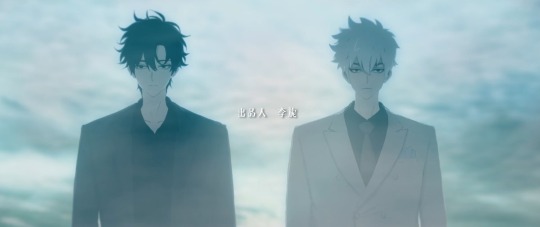
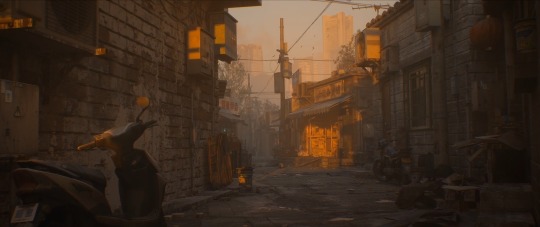
Praise be the powers that be that allowed the original musicians behind season one's electric performances return to double down on their work for this new season (and even collaborate on them!). Of course, they're not the sole attraction as stunning visuals and incredible solo efforts weave two very different and unique stories for this opening, which I'd love to explain here today.
Vortex - JAWS
youtube
This opening is incredibly interesting for countless reasons, but arguably the best is that it's a solo effort that incorporates the unique experience and background of its talented creator, Somei Sun (who you can find here). Seriously a very cool endeavor that starts with Somei's forte of CGI in an incredibly uncanny-in-a-good-way scene of a teddy bear floating upward.

This sequence very quickly sets the tone for the opening at large as the theme of the reversal of time appears from the very get go. Even with things as simple as the lighting changing from our quick look outside of the arcade the bear is found in.
Even further than that, the first time we see Cheng Xiaoshi is under this water that the bear is floating up from within. Very clear symbolism for drowning and being forgotten (alongside a few other key objects that will play into this season).

Soon after this we transition the silhouette of a character obscured in darkness and surrounded by vibrant colors, with various photographs surrounding them. When you slow it down, it's all but obvious that this is Cheng Xiaoshi, and is meant to signify the loss of his sense of self, and the weight that he ascribes to the actions and alterations of the past that he's introduced.
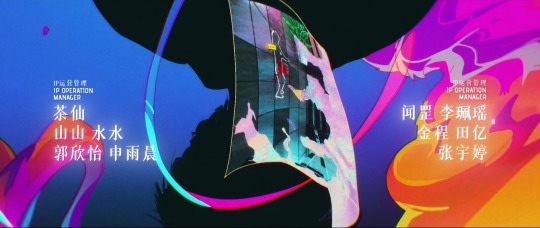
The whole idea of Cheng Xiaoshi being lost and fumbling for where and when he belongs, stumbling through all these pasts and people, is really well exemplified through this frustratingly good cut here.
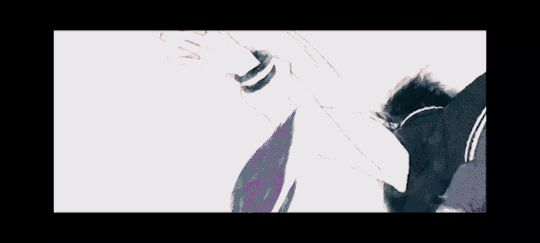
Of course Cheng Xiaoshi and Lu Guang represent Yin and Yang, so what would a sequence about Cheng Xiaoshi being lost in his many pasts be without Lu Guang seeing all the different versions of Cheng Xiaoshi (and even potentially teasing some new ones). Incredible work here, especially with the idea of Lu Guang being "correctly" oriented in time, just instead being frozen in it compared to Cheng Xiaoshi's violent by comparison reversal.

And the whole idea of Lu Guang appearing in a mirror? That's returning from fracturing? And that at the end of this sequence Cheng Xiaoshi appears again? Incredible symbolic work to summarize their relationship and how they exist both within and separately from each other.
Of course, it only keep getting better as we begin a descent into an incredible collaborative effort between animator and musician. First, we start with this sequence of a a child reaching out to the viewer while a larger hand engulfs them from behind. This is then followed up with a teddy bear erupting into a monster.
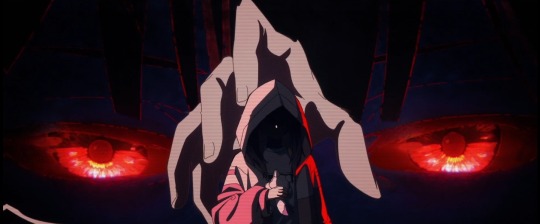
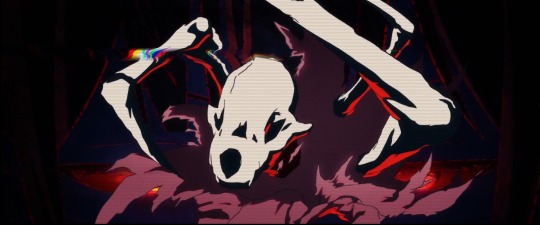
The trick here though comes from this incredible scene. This moment of Cheng Xiaoshi going back in time to attempt to save all of those close to him (and a few "others"), but being unable to reach them he begins his downward spiral through the flow of time once more.
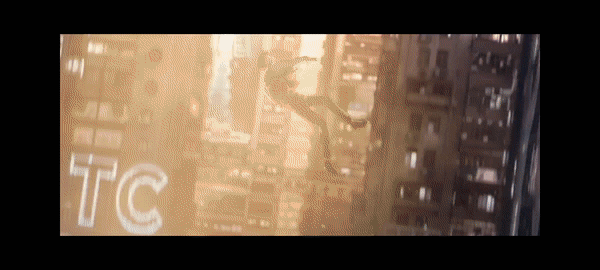
It forces viewers to pose the question: which way is the right way? Is this the story of Cheng Xiaoshi clawing his way back from the depths of the Abyss, fighting backwards through time to create the present that he desires so much? Or is it his descent into atomization that fractures himself and Lu Guang into fragments of the past?
Whichever you see, it's impossible to not view it as an incredible sequence when paired with the music from JAWS that reverses as the flow of time switches. From start to finish it's a stellar opening that puts it on par with some of the heaviest hitters for this year.
The TIDES - Fanka, JAWS
youtube
This ending is a little more straightforward in its storytelling, as Cheng Xiaoshi and Lu Guang are detectives that guided by Qiao Ling through an abandoned mansion to find something. In that sense it's rather literal, but the imagery shown and story told is more implicit.
Take this first still from within the mansion. A painting that shows a man and a woman together, obviously meant to display the closeness the two have.
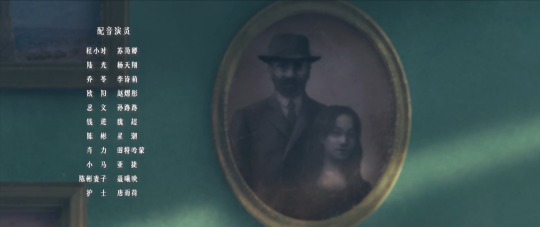
The pair appear through Cheng Xiaoshi and Lu Guang's exploration of the mansion quite often, and in very interesting and leading layouts.
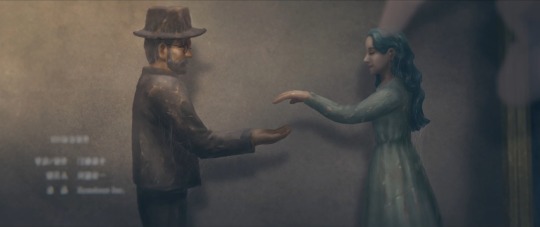
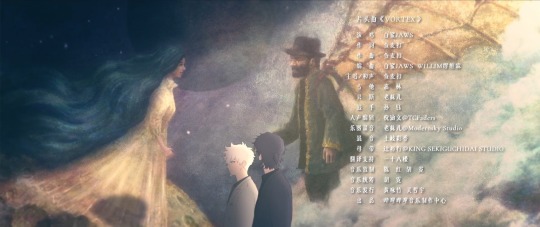
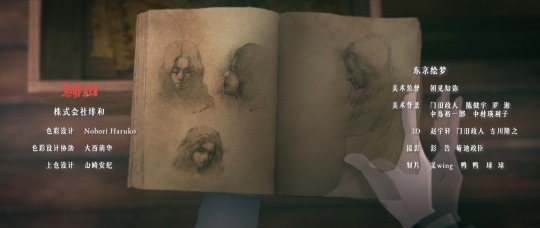
The idea is that the woman is depicted as beautiful, the apple of the man's eye. A Saint that exists in opposition to his more devil-like existence. Someone that exists across from the man, so close yet so far away.
Regardless, through their exploration, they find figures of the man and woman with their hands reaching out for each other, and once their hands touch a secret door opens up. Through this secret door they find what could only be a time machine.
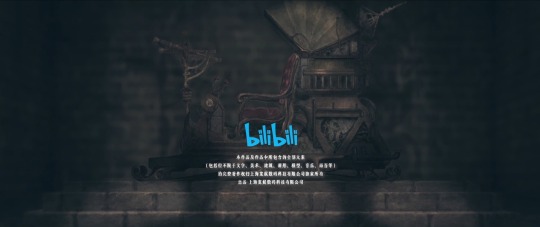
If the pieces weren't clear enough, this ending is all about one man's love for his (presumed) wife, one that he lost before himself. One that he could not give up, that he could not forget. A wife that he loved so much he would dare to defy time for. It's a really lovely and interesting story to tell from an outside perspective such as Cheng Xiaoshi and Lu Guang's. Not stronger or better than the opening by any means, but still a very solid ending that tells a unique story.
#link click#time agents#shiguang dailiren#shiguang daili ren#shiguang#cheng xiaoshi#lu guang#qiao ling#donghua#anime and manga#anime#anime opening#anime ops#anime ending#时光代理人#Youtube
127 notes
·
View notes
Text
Trope chats: the core trio

The "core trio" is one of the most recognizable and enduring character group dynamics in fiction, frequently seen across genres ranging from fantasy and science fiction to coming-of-age stories and adventure novels. This trope revolves around three characters who form a central team, often embodying complementary skills, personalities, and perspectives. The core trio offers a flexible structure for storytelling, allowing for a balance of conflict, cooperation, and character development. It also serves as a microcosm of social dynamics, symbolizing friendship, diversity of thought, and the idea that different strengths are necessary to achieve common goals. However, the trope also comes with narrative risks, such as predictability, over-reliance on established archetypes, and the potential for underdeveloping one or more characters.
This essay will explore the core trio trope as a literary device, examine its common pitfalls, delve into its societal influence, and outline the typical archetypes that tend to form this dynamic.
The primary strength of the core trio lies in its ability to create balance within a narrative. By distributing different traits and abilities among the three characters, the trio often becomes stronger as a unit than as individuals. For example, in J.K. Rowling's Harry Potter series, the trio of Harry, Hermione, and Ron exemplifies this dynamic. Harry is brave but often impulsive, Hermione is the intellectual and planner, while Ron provides emotional support and loyalty. Their different strengths are essential to overcoming the challenges they face, and the trio dynamic allows for varied interactions and conflicts that drive the plot forward.
In terms of storytelling, this balance provides flexibility. Each character in the trio can take turns leading, depending on the situation. For example, Hermione's intelligence saves the group in academic or puzzle-based challenges, while Harry's bravery leads them through dangerous confrontations. Ron’s emotional insight often helps resolve interpersonal tensions or find the human element in complex situations. This variety prevents the narrative from becoming monotonous or overly reliant on a single protagonist, enriching both plot progression and character development.
Furthermore, the trio allows for a more layered exploration of themes, as the characters can embody different facets of a central idea or thematic question. In The Hunger Games, the core trio of Katniss, Peeta, and Gale explores themes of survival, sacrifice, and resistance, with each character offering a different perspective on how to navigate the dystopian world they inhabit. Katniss represents a pragmatic, survival-oriented outlook; Peeta brings empathy and a moral compass; Gale embodies a more revolutionary, aggressive approach. The tension and interaction between these perspectives create depth and complexity in the narrative's exploration of rebellion and justice.
Another major use of the core trio trope is that it serves as a microcosm for social groups or even society as a whole. The diversity within the trio often represents a broader spectrum of human experience, allowing authors to explore questions about unity, difference, and teamwork. Trilogies like J.R.R. Tolkien’s The Lord of the Rings and Rick Riordan’s Percy Jackson series use their core trios to symbolize the idea that collective strength arises from diversity—whether it's diversity of thought, background, or capability.
In many instances, the trio dynamic underscores the idea that no one individual can succeed alone, highlighting the importance of collaboration and interdependence. This is a particularly valuable theme in genres such as fantasy or science fiction, where the trio often faces larger-than-life challenges. In such stories, the unity of the trio becomes a metaphor for societal cooperation, with the group’s success symbolizing how different kinds of people, ideas, or skills are needed to face complex or insurmountable odds.
The core trio often draws from a set of common archetypes, which serve to maximize the contrast between the characters’ personalities and roles. While these archetypes vary depending on the genre, certain patterns recur in many of the most iconic trios. Below are some of the most frequent archetypes found within core trios.
The leader or hero archetype typically holds the spotlight and is central to the story's main conflict or journey. This character is often the most proactive, tasked with making the major decisions, and carries the weight of responsibility for the group. Examples include Harry Potter (Harry Potter), Frodo Baggins (The Lord of the Rings), and Katniss Everdeen (The Hunger Games).
The hero tends to be morally complex or flawed in some way, as this helps humanize their character. Harry struggles with feelings of inadequacy and destiny, Frodo is weighed down by the burden of the One Ring, and Katniss wrestles with her role as a symbol of rebellion. While they are the focal point of their respective narratives, they often rely on the support of their companions to navigate the emotional and physical challenges they face.
The intellectual or strategist is the problem solver of the trio, typically using logic, reason, and knowledge to overcome obstacles. This character’s main role is to think ahead, analyze situations, and provide the brains behind the trio’s operations. Hermione Granger (Harry Potter) and Annabeth Chase (Percy Jackson) are archetypal examples of this type. Both characters are known for their intelligence and resourcefulness, often formulating plans that keep their companions out of danger.
The intellectual can also be more emotionally detached or socially awkward, often contrasting with the more action-oriented or emotionally-driven members of the trio. This dynamic creates tension but also emphasizes the value of diverse approaches to problem-solving, reinforcing the theme of collaboration.
The third archetype typically fulfills the role of "the heart" or the emotional anchor of the group. This character offers loyalty, emotional support, and a grounding force to balance out the more extreme traits of the leader and the intellectual. Ron Weasley (Harry Potter), Samwise Gamgee (The Lord of the Rings), and Simon Lewis (The Mortal Instruments) all serve as emotional anchors in their respective trios.
This character also often provides comic relief, softening the tension in difficult situations. Though they may initially seem less crucial to the group’s success, their emotional resilience and loyalty often become central in moments of crisis, demonstrating that heart and emotional intelligence are just as important as bravery or intellect.
These archetypes—leader, intellectual, and heart—allow for a complementary distribution of skills and personality traits, creating narrative balance and giving each character distinct strengths. While these archetypes are common, effective trios typically subvert or deepen them over time, adding complexity to the relationships and individual arcs.
One of the major pitfalls of the core trio trope is predictability. Because this structure is so prevalent in fiction, audiences may come to expect certain roles and dynamics within a trio, which can lead to a lack of narrative tension or surprise. For example, if readers know that one member of the trio is the "leader" and another is the "heart," they may anticipate the ways in which these characters will interact or solve problems, diminishing the emotional impact of the story.
Additionally, trios can sometimes fall into the trap of stereotyping, especially when archetypes are rigidly adhered to without room for development or subversion. For instance, the "intellectual" character might be reduced to a walking encyclopedia, with little emotional depth, while the "heart" character is relegated to comic relief without meaningful contribution to the plot. This flattening of characters can make them feel more like plot devices than fully realized individuals.
A related issue is the potential for unequal character development within the trio. Oftentimes, one or two characters receive the majority of the narrative focus, while the third is left underdeveloped. This is particularly common when one character, typically the "leader," dominates the story. For example, in some interpretations of The Hunger Games, critics have pointed out that Gale is often sidelined in favor of Katniss and Peeta’s emotional arc, making him feel less integral to the core trio, despite his thematic importance.
If the trio becomes imbalanced in terms of development, it can weaken the group dynamic and lead to a lopsided narrative, where certain characters feel more like sidekicks than equals. The challenge for authors is to ensure that each member of the trio is given sufficient depth and agency, so that their contributions feel equally valuable.
Another potential pitfall is over-reliance on the group dynamic, which can limit individual character growth. When a trio is defined primarily by how the characters relate to each other, their personal arcs may suffer. The characters become so intertwined in their roles within the group that they fail to develop independently. This issue is common in long-running series, where the trio becomes a narrative crutch, leading to repetitive group interactions and limiting the possibility for solo character arcs.
For example, in some long-running television series, the core trio remains static in their relationship to one another, even as the plot moves forward. The lack of individual growth can make the trio feel stagnant and unchallenged, reducing the emotional stakes of the story.
The core trio trope often reflects broader societal structures, particularly around the themes of collaboration, diversity, and unity. The trio dynamic frequently symbolizes the idea that different perspectives and skills are necessary to achieve success, offering a counterpoint to narratives that glorify the lone hero. This reflects a societal shift toward valuing teamwork and interdependence over individualism, mirroring real-world trends in workplaces, education, and social groups, where collaborative efforts are increasingly prized.
The trio's emphasis on unity through diversity also has a social resonance, particularly in contemporary fiction that seeks to challenge monolithic or exclusionary representations of heroism. Diverse trios, whether through differences in gender, race, or background, embody the idea that strength comes from multiple viewpoints. In this way, the core trio trope can challenge societal norms around leadership, heroism, and cooperation, offering a model for how communities can work together despite differences.
The trio often functions as a symbolic representation of balance and harmony. In many narratives, the trio must learn to align their strengths and weaknesses to achieve their goals, symbolizing the broader idea that balance—between intellect, emotion, and action, or between differing worldviews—is key to success. This idea is particularly common in fantasy or adventure genres, where the trio’s journey often involves learning to reconcile their differences to overcome a larger, external threat.
In stories where the trio fails or fractures, this breakdown often symbolizes larger societal or moral failures. For example, in stories like The Dark Knight Rises, where the trio of Bruce Wayne, Alfred, and Commissioner Gordon temporarily splinters, this schism represents broader thematic concerns around trust, loyalty, and the challenges of maintaining integrity in a corrupt world.
The core trio trope is a versatile and powerful tool in fiction, providing a narrative structure that balances character dynamics, explores diverse perspectives, and offers a microcosm of societal cooperation. By distributing strengths and weaknesses among three distinct archetypes—such as the leader, intellectual, and heart—the trio can reflect themes of teamwork, diversity, and unity. However, this trope also comes with challenges, including predictability, unequal character development, and the potential for over-reliance on group dynamics.
In terms of societal influence, the core trio often mirrors collective ideals around collaboration and balance, emphasizing the value of different strengths working together toward a common goal. When used thoughtfully, the core trio trope not only enhances the storytelling experience but also offers symbolic commentary on the importance of diversity, unity, and mutual support in overcoming life’s challenges.
#writeblr#writers of tumblr#writing#bookish#booklr#creative writing#fantasy books#book blog#ya fantasy books#ya books#fiction writing#how to write#writers#am writing#fantasy writer#female writers#story writing#teen writer#tumblr writers#tumblr writing community#writblr#writer community#writer stuff#writer problems#writerblr#writers community#writers life#writers corner#writers on tumblr#writers on writing
9 notes
·
View notes
Text
I have literally hundreds of hours in Inquisition; I enjoy it; I am not typically an Inquisition hater. But saying DATV is a departure from Dragon Age in terms of theme generally has me ???? because outside of the DLCs, I can't think of a single unifying message that Inquisition is trying to present.
There are some delicious angles that the Fandom read into the game. One of them even got fleshed out in the Descent DLC with Ameridan. (History/faith/politics can warp and turn a person into a symbol that is stripped of their actual convictions and identity, particularly when doing so is politically useful).
Could you say, separate from the lens you bring to it as you actively roleplay, that the Inquistor's story was meant to comment on that experience of being alienated from yourself by expectation?
Generally speaking, I feel like one of Inquisition's flaws was that it was so concerned with trying to offer the player both sides of every choice that it ended up not having much to say about the majority of those choices on the whole. I think that was one of the biggest issues with the Mage-Templar conflict, actually.
(Specific characters sometimes did have moments of commentary, which again, Inquisition had some excellent character writing. I can kind of see a "message" in some of what forces the characters to leave you or what gains their trust more than any other part of the game. But I wouldn't say the larger game itself handled most of its choices in a way that gave weight to a specific over all message.)
This may be a case of me nitpicking; I think people often say theme when they mean tone (tragic/dark/dark comedy/whatever) and topic (the different races in Thedas being one I see brought up a lot.)
It's just weird to me because the criticism seems so totally opposite of the way I experienced both games. Veilguard has some structural flaws, specifically places of uneven development. (I love Taash but everything else to do with Rivain and the LOF feels like an unneeded afterthought in terms of the larger story, as opposed to factions that are very deeply embedded like the Wardens/Crows/Shadow Dragons/Mourn Watch.) But the one thing you cannot fault the game for is lack of something to say.
2 notes
·
View notes
Text
Episode 21 - A Bow Meow on the Moon
If you notice a dip in quality of my screenshots, it's because this liveblog is being written from my phone, and wifi was Bad while I was writing the first half.

I am very excited to finally watch this one.
For a variety of reasons, its one of my favorites in this show. And, it is also, coincidentally, one of the most important episodes of the show. Both thematically, and to me, personally.
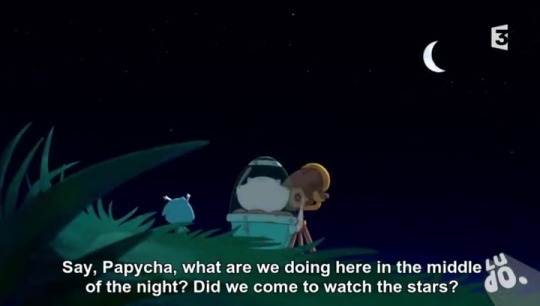
I know that often, the writers use Joris for exposition, but I love how this implies that Kerubim took him here as a surprise, and now Joris is asking questions.
Though I guess that taking kids out in the middle of the night for some random stuff is just a Dad thing in general.
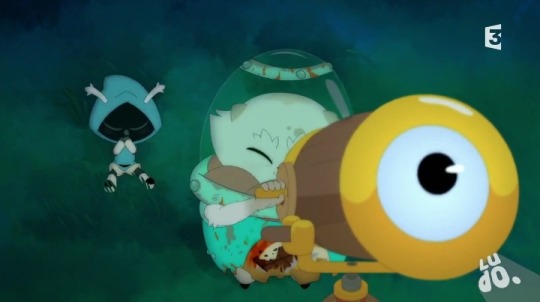
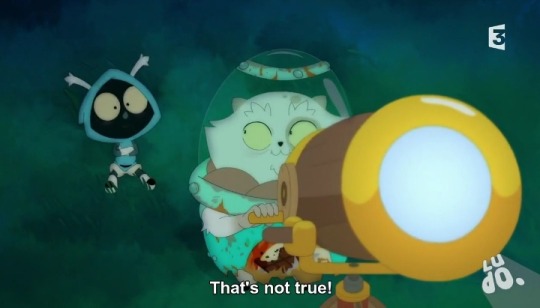
I'm pretty sure this is the first time so far that Joris has really went "you're Lying papycha!" at Kerubim in the series, which is a far call from the first episodes, where he was, quite literally, amazed over a clothespin because of him.
Joris's growth is subtle due to his age, but it is present. His relationship with Kerubim has matured enough for him to understand that Kerubim might lie to him.
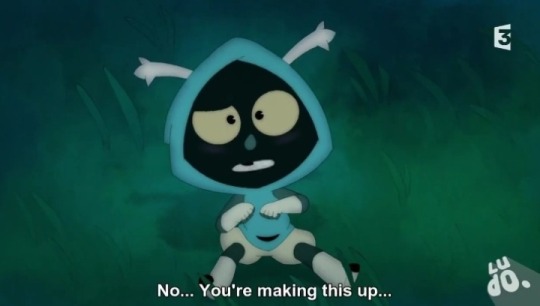
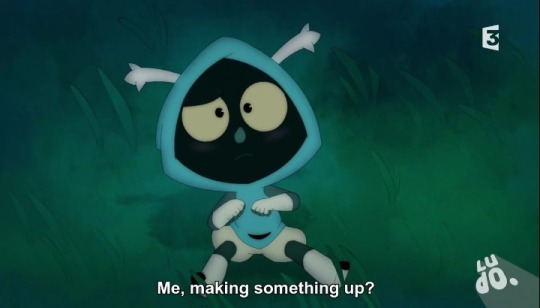
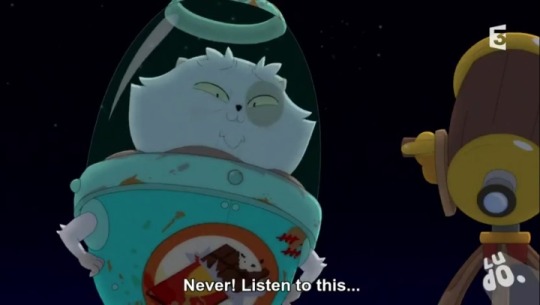
Though it's easy for Kerubim to make Joris doubt his own hunch, even before telling the story.
Btw its funny to see The Lying Guy be like "me?? Lying?? Never!".
Never change, Keke.
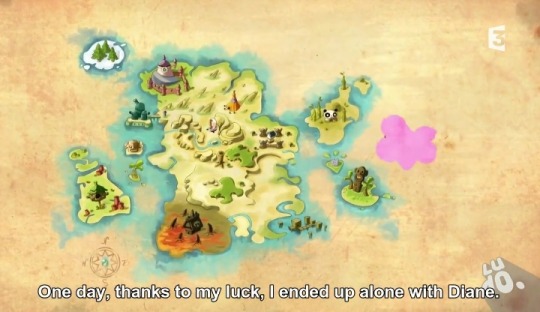
This is a very beautiful render of the World of Twelve. Hnn.
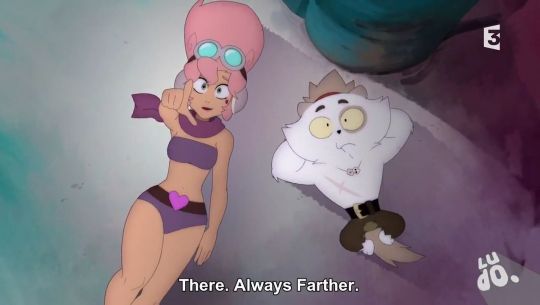
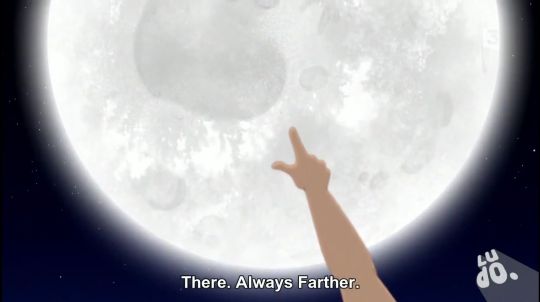
...I am not going to survive this episode, emotionally speaking.
I don't really know how to explain the way this episode gets to me.
In a way, it reflects the show, and the franchise in general.
In Wakfu, the night sky, and space itself, often symbolizes the wild yonder, longing for something.
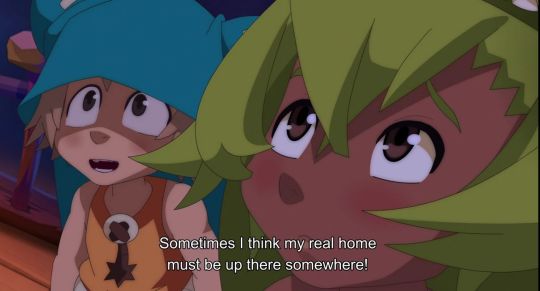
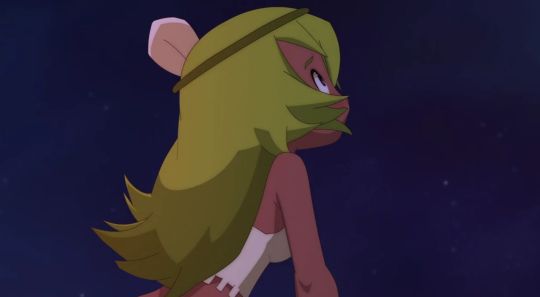
New experiences, a safe place, a home, a place of freedom.
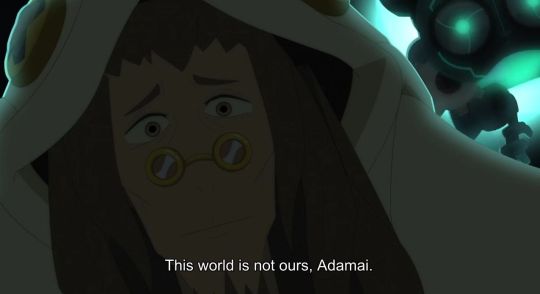
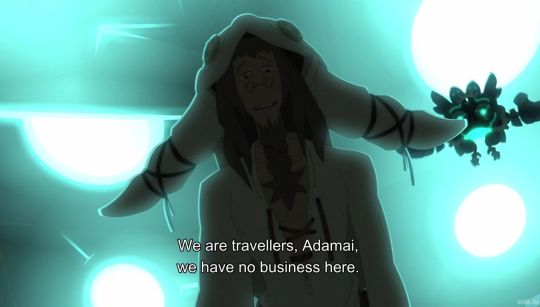
The pain of desires unfulfilled.
...I don't like going ahead, and talking about Dofus Aux Tresors as a part of a larger whole. Because it deserves to be discussed as a standalone work of fiction, like all other parts of Krosmoz. But it is time to address the elephant in the room at least a little bit. (Picture me putting on a tinfoil hat.)
All of these themes are especially sharp when coupled with immortality.
And Krosmoz is, in a lot of ways, a franchise-wide study of immortality and family. How these two concepts intertwine, how immortal characters cope, or fail to. (Especially in Wakfu.)
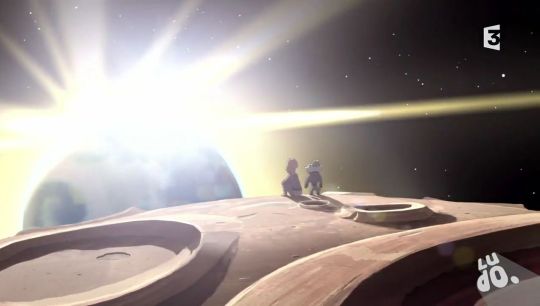
Sure, there is a lot to be said about the longing that is inherently intertwined with immortality, but there is even more to be said about immortality as a type of longing for the unfathomable, a wild yonder in on itself. How standing at its threshold is similar to stargazing.
Kerubim is a character who wants, deeply. And he wants a lot of different things. As an old man, he longs for his youth, the relationships he lost, and the freedom of adventure. As a young man, he longs for pure human connection, being liked and wanted. He is a perpetual motion machine, even if by the time of the series, he has mostly stopped going.

But he, just like Joris, is a perpetual motion machine. Even if he has seventy, eighty, ninety, or a hundred years behind him, there are hundreds more to come.
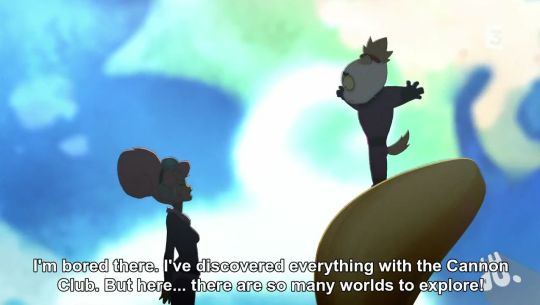
That's what makes this show special to me. It is a single step away from the wild yonder of immortality. Just for a second, we can know Kerubim and Joris as an old man and a child, characters we can relate to and understand. But in a minute, they will be moving endlessly, farther and farther away.
Somewhere we can't ever truly follow.
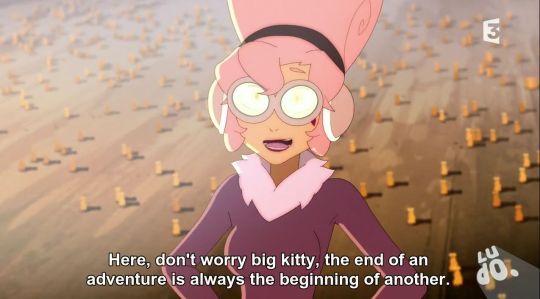
And compared to their lives, this show will end up feeling like a grain of sand. A small snapshot into what they were before life truly began, a pale shadow of the people they will become and the experiences they will have.
It is a show about longing and anticipation. The wild yonder of the future, and the things that aren't meant to be.
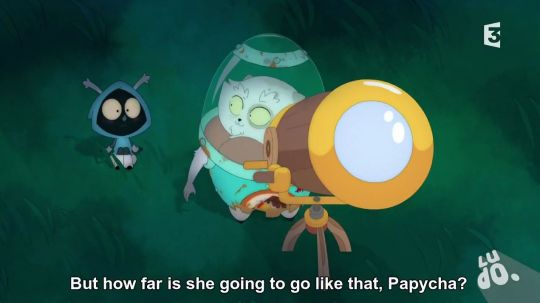
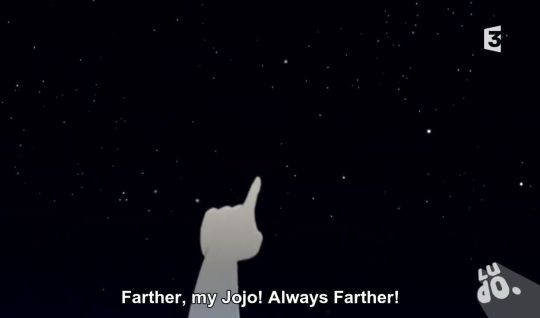
It's a show about endings. And it's a show that rejects their existence altogether.
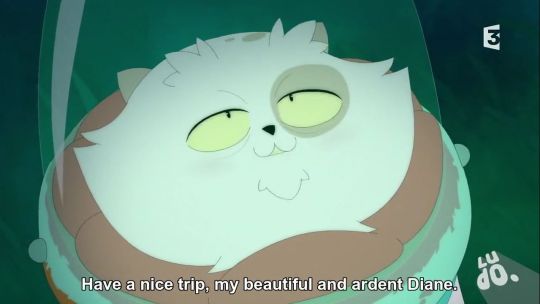
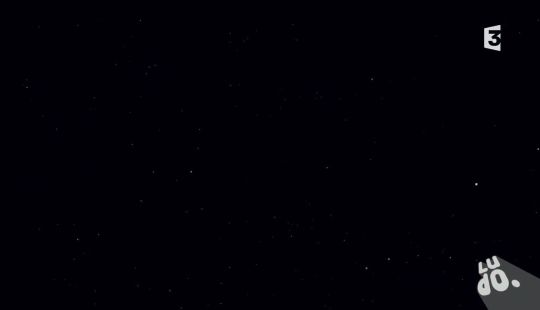
I don't have much to say about the lunarians, or Diane herself, outside what she represents, — so this liveblog came out a bit different from usual, but I hope it was enjoyable regardless.
#ep21#wakfu#dofus#krosmoz#ro liveblogs dofus#joris jurgen#kerubim crepin#im so normal right now.#haha#anyway the naus and the emperor guy in this episode are gay. but i didnt want to note that down in the middle of the immortality/space talk
20 notes
·
View notes
Text
Starting Yet Another creative project to put together my own oracle deck since the one I have is... I mean, it's alright. But I don't really vibe with the art or the card meanings as well as I'd like to. So obviously,,,, I gotta make my own huh.
Details under the cut for length because I'm rambling to myself as I flesh this idea out
I'm using this pad of smallish scrapbooking paper to make the cards since it's a thicker cardstock (and it has nice colors). I figure I'll sketch out my designs and then paint over them since this paper can handle paint without being destroyed. Perhaps a junk journal theme using my large collection of stickers.............
Undecided if I want to cut the papers own in size at all, since one of my main problems is that the oracle deck I have now is hard to shuffle due to card size. Which is... also my problem with most oracle decks, tbh. Scraps would be used for other projects and things. Smaller pages would also be easier to fill, using less materials and encouraging overlapping things for a fuller look.
The other issue with oracle decks is that they just don't vibe. The imagery is usually nice and all, but the cards themselves don't depict things that actually matter to me and my practice. Even if the theme matters or I like the art, there's always That One Card I just don't care for.
Oracle decks, to me, are meant to provide guidance rather than answers. Advice for next steps, inner strengths to draw on, or energetic focuses to improve or deal with a situation. They add color, context, and flavor to readings done with other cards. This deck will be no different. My goal is to create an oracle deck that specializes in general guidance and actionable advice in a broad sense.
As for theme... I mean, it makes sense to center it around The Lady, right? The ideals and imagery I associate with Her would be a good starting place, at least. Maybe a combination of symbols I look for in nature (transitory signals between seasons and parts of seasons) and the Lady's direct symbols.
A list of meanings......
The Lady - Fate as a force, the larger whole, direct message coming through
Yarn - Connections, weaving
Knots - Tying, making connections, fixed moments
Crossroads - Choices, split paths
Death - Change, endings
Mushrooms - Decay, afterlife, resilience
Bread - Creation, rising, hearth
Pen - Writing, creativity, keeping records
Book - History, learning, stories
Paint - Art, inspiration
Key - Opening doors, opportunity, answers
Lock - Secrets, blocked path, challenge, questions
Door - Passage, transition
Sea - Depth, tides, deep knowledge, mystery, movement (eternal)
River - Movement (fast), travel, change
Butterfly - Transformation, transition, trust, day
Moth - Transformation, transition, faith, night
Stars - Dreams, hope, wishes, stories
Void - Space, nothingness, in-between
Moon - Phases, visions, seeing in the dark
Clover - Luck, good fortune
Broken mirror - Bad luck, poor chances, mistakes
Dice - Chance, gambling, games
Playing cards (poker?) - Games, deception, skill
Spider/webs - Trap, sticky, pattern, weaving
Tarot - Divination, the future, advice
Seeds - Potential, sowing
Flowers - Growth, beauty, production, fleeting
Grave/headstone - Death, grief, memory
Candle - Ritual, altar
Lighthouse - Beacon, signs, lookout
Eyes - Knowing, seeing
Ghosts - Afterlife, spirits
Bees - Industry, teamwork
Sunrise/sunset - Beginnings, endings (the only reversible card?)
Leaves (different colors) - Changing seasons, time passing
......and probably more as I start putting these dang things together. Once they're finished, these cards will replace the ones I currently use for add-ons in paid readings. I'm looking forward to making these!!
#aese speaks#divination#oracle cards#diy divination tools#fun fact: i stood up to make coffee & breakfast before writing under the read more#and just wrote 'gottem'#but forgot between doing it and getting the coffee. so i did indeed. get myself#also. i think kofi supporters will get a look at individual cards as i make them#so. yeah#hello fellow tag readers
17 notes
·
View notes
Text
i am. not normal for dan heng. (or dan feng, as i’ve realized)
but ichor of the two dragons. god????? honestly i had ignored a lot of the animations from hoyo before because i just wasn’t that invested.
but i could talk so much about this one animation.
dan feng
(because i say “he” a lot and uh. it is kind of hard to tell)
general story
the animation basically states that dan heng, after the xianzhou luofu trailblaze mission, he visits places of significance to dan feng.
the whole thing, i think, is meant to convey dan heng trying to accept the fact that he was dan feng once, but reaffirming that he is not him. he remembers, feels, maybe, but that was not his life.
maybe it’s trying to put his (negative, complicated) feelings towards his previous incarnation to rest. because he finally had to confront it after constantly running from it, from sins he doesn’t understand.
i think dan heng believes he has put his past behind him. that’s why he goes (other than no longer being exiled)
i find it really interesting that the sky doesn’t turn dark until he starts to walk away. that it comes from behind him, and dan heng doesn’t notice until it overwhelms his world entirely and he can’t run anymore.
then the water comes.
water, cloudhymm, a power that comes specifically the man he doesn’t clearly remember being, a person that was denied the chance to live his full life, a person of a ‘home’ dan heng never had the chance to see and they both were locked away from.
he is drowning in memories of a past he wanted to deny so badly.
dan feng’s (i’m going to have a whole second on him so his dialogue isn’t the point) entrance is from behind dan heng. a constant shadow on his present life, a dark that follows him even as he can be happy, maybe especially because of that (light creates shadows).
the fact that dan heng and dan feng (in any language i checked the credits) do not share the same voice actor despite the fact that blade and yingxing do and that people keep seeing them as the same person. i’m 90% sure that was done on purpose because voice actors are great and i’m sure anyone who voices dan heng could go regal and proper and voice dan feng as well, and yet they chose not to.
the petals that fall down are the mara petals that the soldiers have. the red petals on the statue i can maybe excuse as a drink thing? but out of any color, they chose the gold of those consumed by mara.
and when dan heng ‘sees’ (i don’t think this portrayal is accurate to how he was in life?) dan feng, his immediate reaction, despite having a weapon to his throat, is “I have to leave.” he is frozen and can’t do anything against him (dead)
this establishes the theme: he still isn’t over dan feng’s place as his past. he still doesn’t want to face it.
he doesn’t look him in the eye—he can’t, he shakes and closes his eyes and avoids it—doesn’t turn completely, doesn’t defend himself. his first instinct—as it had been for blade when he had that nightmare right before the xianzhou luofu mission—was avoidance. but like the lightcone—there was “nowhere to run”.
kudos to the voice actors, because dan heng’s voice is shaky and quiet and dan feng is calm and constant. it matches the animation— dan heng is constantly moving his eyes and being taken off guard, but dan feng barely moves at all.
i’ve seen people talk about the next scene. but really. the symbolism? there is nobody but the two of them in that world, both have shadows, and yet there is a larger one vaguely resembling another person casting over the both of them.
and the next! the difference in their fighting styles is really apparent here, i think. dan heng is still in his human form, legs wide. dan feng isn’t using the spear (cloud piercer?) anymore. he’s preparing to use cloudhymm, something dan heng cannot (won’t?) do in his current form. something he never wanted to, because that meant confronting his past as dan feng.
the fight itself is so cool but i’m not very good at that but. dan heng keeps trying to move forward, is actively getting closer, but he does not land a hit on dan feng at all. he misses, is not enough, is pushed back. he cannot change the past, and dan feng is that past.
there’s no reason for dan feng to raise himself up— dan heng wasn’t managing to hit him at all. a symbolism, i think. the luofu does not see dan heng. they see dan feng, put him on a darkened pedestal, because despite if they think he was wrong or right in whatever sin he committed, there was no denying that he was one of (if not the, if i can remember the shade’s words correctly) strongest vidyadhara high elders ever.
okay i’ll say more about it later but dan feng now says “You have nowhere to run.”
—and then dan heng can’t even push back the water at all, unlike when he could at least deflect them earlier in the fight.
and he hasn’t gotten up. he’s not trying to catch up to dan feng and defeat him anymore. he’s just staring, until the very last scene before he’s hit by the water dragon and is dragged into the water, loses his grip on his weapon.
the resulting scenes of the past, of dan feng’s memories (jing yuan, yingxing, jingliu, the preceptors (?) not caring even for dan feng, just the knowledge only he holds)
darkness. for, not that long, but quite a while.
his eyes opening, bubbles, breathe, his life coming back to him.
the astral express. basically insignificant dialogue, but to dan heng, at that moment, they are the words he needed to hear.
himeko’s “you’re one of the express crew” he, dan heng, not dan feng, belonged. dan feng never was and so he cannot taint that. march, calling out his name, doing something simple and mundane with stelle having zero reason to be there but is anyway, just to see him.
pom pom’s doesn’t have much, but the fact that he remembers it means that one time, before stelle/trailblazer came abroad the express, he was in the main train cart with the rest of the crew. that sense of belonging.
his eyes, almost lifeless, blinking, instead of to avoid his last, to clear his head and to wake him up, to continue forward, upwards, to not be dragged down by a shadow of who he cannot be, even if he wanted to (he doesn’t, mostly)
acknowledgement. at last. “You are my past.” him finally understand that it doesn’t define who he is as dan heng. that he “won’t follow [him] into [his] future!”
explosion, breaking away from it all, light, genuine, bright yellow light, for the first time since the sun was out in the beginning of the animation.
aaaa i wanna talk about the line he says, but i’ll save that because it has to do with dan feng.
standing opposite sides of the statue of both of their past life as yubie. facing away, facing downward. mirrors, at last and always, and yet.
(the rain, washing everything away.)
dan feng, a constant, and yet a small shift. a willingness to let dan heng live, now.
“and don’t look back”
for once, it isn’t fear. it is advice, closes his eyes, and disappears into gold.
and he is at peace. doesn’t deny he was reminiscing at the statue. that (some of) his memories are dan feng, without having to reaffirm that “he still is dan heng” or that “i’m not him”
final shot, the astral express.
dan heng’s present, and his future.
(god i loved this animation.)
———
dan feng + dialogue
his entrance, to dan heng, came out of nowhere. he (it) crept up behind him until he couldn’t ignore it and it was threatening him.
my take on this animation is: it is not set in the real world. maybe, probably, some shenanigans happened with the sedition of imbibitor lunae that means blade is somewhat right in his insistence that dan heng is still dan feng in some ways more than just being his reincarnation.
but even if that’s not the case, i think the fight is all in dan heng’s head/conscious, in an attempt to reconcile his past in front of an area that shouldn’t be significant to him, a statue of his way past life, while he was trying to leave for his present.
note: i don’t think dan feng’s particular ‘punishment’ had ever been used as a punishment before because of the severity of the crime he committed and so there could’ve been unforeseen consequences of that. especially since the molting rebirth was messed with by the preceptors(?) to try to keep the transmutation arcanum alive.
his words, in particular i think, are dan heng’s subconscious listing all of his fears.
“how long will you keep running?” (that’s all he’s been doing since he was banished)
“you’ll find no refuge among the stars.” this line makes it clear to me (i think) that this isn’t dan feng. why would he know of what happened after his death? why would he be bitter(?) when he seemed so calm and at peace in “myriad celestial trailer — “history of the xianzhou: exodus of the five dragons””?
baiheng is confirmed to be the foxian of the high cloud quintet. baiheng was a nameless, someone who goes from world to world, among the stars. “dan heng’s” guilt of bailu’s existence (implied to have been baiheng because of her dreams starting after getting on the astral express + dan heng’s companion mission)
he doesn’t even say “escape, peace” he specifically says refuge.
“the high elder succession is as eternal and unyielding has the ancient sea” (he does not want the title)
“you are my reincarnation. a mirror image. a past life’s sin must be repaid in this one”
this line. dan heng struggles, so much, with his identity. half the reason i think he stayed on the astral express other than genuine fondness is the fact that they had no connection to dan feng (other than being nameless, but that was not dan feng’s title. it was not something exclusive to the luofu, that belonged to people unrelated to him. it belonged to someone dan feng cared for so much that he was willing to commit crimes that it probably subconsciously leaked into dan heng.)
he could protect (while he believes(?) that all dan feng did was destroy (doesn’t have his healing powers)) while not having to face his past because they did not make him.
and the part about past life repaying sins— i don’t think that is something dan feng of the high cloud quintet, when he was alive, would say. we only have one (what i consider) accurate scene of him chained in the prison, and he is calm, unlike dan heng’s light cone “brighter than the sun”. dan feng’s punishment was unique to him— usually, any sins were washed away after being reborn, because the vidyadhara believe that the reincarnation does not equal what came before them.
i think that idea got kind of muddled, after dan feng’s punishment. especially since in dan heng’s companion mission, all they see is dan feng. maybe it’s because of what the preceptors did, that made him so similar looking to dan feng, but that’s just a theory.
anyway.
dan heng responds to that, “I’m not you!”
dan feng is mostly. stationary. he moves his arms a little, dodges, but he is like a wall, that dan heng can’t cross, can’t break, until he does.
“i will blaze a path of my own.” his will, he wants to continue trailblazing with everyone, wants to be his own self, and he’s willing to fight for it instead of running and hoping for his last to never catch up.
“it is futile.” again, these are dan heng’s fears spoken through his greatest one: dan feng.
(well, blade scares him, yes, but because he is trying to murder him, and the fact that his existence screams to him that he is dan feng, that dan heng doesn’t and won’t exist towards others, that he cannot have things of his own because he (both dan feng and blade) will take them from him)
his transformation. he uses everything at his disposal to win.
(also, switch from left to right hand— is that something he consciously did? or is that one difference of dan heng to dan feng?)
#dan feng#dan heng#imbibitor lunae#yinyue jun#ichor of two dragons#honkai star rail#hsr#i don’t want to call this an analysis because it’s not professional in any way#but that’s the closest description to what this is#i really wanna watch the original chinese to see what changes they made for translation in english
26 notes
·
View notes
Note
Please elaborate on your hatred of those two childhood movies!!! Is it mostly the fact that they overshadow their books, or are there things about the movie itself you hate?
Muahaha you have triggered the infodump. For reference, the two movies are How to Train Your Dragon and Rise of the Guardians.
So it is partially the overshadowing of the books. A lot of people that I talk to about the HTTYD movies are shocked to find out they were based on a book series, and I resent that! Maybe it's just a personal thing, but I was raised to read the book first before watching a book-based movie (rule was broken for LOTR but that's not the point), and I watched the movies because I loved the books. I really just want more people to read the books, because they are amazing and have themes that the movies don't touch on.
Which leads me to my next point- I would be much more fond of these movies if they weren't attached to the books. Both of them are great franchises on their own, but have literally no connection to the books except names, and in HTTYD's case even change some of those!
The HTTYD books work around a main theme of history repeating itself, as well as the found family formed between perceived underdogs and how that clashes with blood family. Things that seem isolated in earlier books are all pulled together in a damn good prophecy plotline in the ninth book, but they still work to support each other in earlier books and keep you engaged, because you can tell there's something pulling all these things together but you don't know what yet. The movies just throw all that out the window. For one, in the books dragons have been working with humans for centuries, and Hiccup is the only person who can speak to them (literally talk in their language). The movies throw that out, which kind of screws with the whole "bonds between underdogs and weird kids" theme. Also the movies just nix all of Fishlegs' storyline (feeling left out because he's an orphan, having inheritances from his blood family and wanting to know more, etc), which makes me so angry because they did him so dirty. Toothless in the books is a little tiny green bastard who is a cool rare dragon like in the movies, but it takes ten books to get there and isn't greatly plot relevant. He's not the kind of status symbol like in the movies, he's actually seen by the rest of the tribe (read: Snotlout) as an indicator that Hiccup is useless and not worthy of the chiefdom. Astrid in the books doesn't really exist, and there is no love story because Hiccup is about 15 by the end of the series. On a larger scale, the movies just have wildly different plotlines built to get across different themes.
Ok, now ROTG! They did a slightly better job by getting across the idea that magic is based on belief, which is a central tenet of the books. However, my main beef is eliminating Katherine. One could make the argument, like I'm about to, that Katherine is really the central character of the books. She's shown as a parallel to Mother Nature (also not in the movies) who is Pitch's literal daughter and extremely morally gray because of it, and the parallel serves to show how Pitch's very basest motivation is this suffocating love for his daughter. That love is what makes him Pitch in the first place, he kind of loses sight of it for a while, but then the love is what makes him obsessed with Katherine as a vehicle to correct his mistakes and "replace" his daughter (never mind his literal actual grown daughter who kinda hates him). Clearly the movie doesn't get into any of that, because Katherine isn't in them! I'm kind of salty that the movies removed Nightlight and sort of replaced him with Jack Frost, but Nightlight goes along with Katherine so I kind of get it. The movies gave Nightlight's role as the calming influence of the group to Sandman, which is ok. I am glad that they at least hinted at Pitch and Sandman's duality, even if it's not explored at all. Also, the movie screwed with both Toothiana's and Bunnymund's personalities, maybe to make them more palatable to kids, but as a kid I loved that Toothiana was a warrior, and I loved that Bunnymund was this analytical, precise character (extremely autism-coded, his special interest was literally chocolate) and how that bounced off North's more experimental and boisterous approach to magic. The changes to them in the movies, in my opinion, didn't really do much for either of them, apart from relegating them to more side characters.
ok this concludes my rant for now (:
7 notes
·
View notes
Note
Hi there! Just wanted to ask something fun: what’s your favourite moment from each of the books you’ve written so far?
lovely lovely question. so much fun. let me see:
book one: i mean, the train station scene was the image that kicked off the whole series, so i have to pick that one. it resonated with me on so many levels — it introduces the running element of muggle music, which becomes a sort of leitmotif for draco and hermione's relationship, as well as draco's own character growth; it's a fun character moment, in that hermione gets to steal the show from draco's gift of an owl, leaving him speechless, when he'd surely have liked it a bit more the other way 'round, and that's going to be a precedent, too; i also just like the moment itself, as a piece of atmosphere and symbolism. it's his first year of being a gryffindor, and he's survived it, and it's sunny outside, and there's music playing.
there's also a fun nubbin of symbolism in that the song playing is supposed to be "white wedding," which is the epigraph from book 1 (and, in a sense, the whole fic), a song about redemption and starting over and yet also taking your past with you, as well as... well, a song about a wedding. so. take that as you will.
book two: narrowly, it's the moment at Theo's Yule Hunt party where narcissa has just collapsed, and the slytherins have all seen it. there's a beat where draco thinks they're going to turn on him, and use this vulnerability they've discovered to knife him in the back — only they don't. theo sizes him up and makes a call, and they help him get her out. daphne even breaks a school rule to do it. and pansy grouches and gripes about it — she gets in one jab about "hall-pass Slytherins," which still makes me giggle, to be honest — but she helps, too. it's a humanizing moment for them, and (hopefully) one of the first times we begin to see the slytherin kids as possible allies — utter brats, still, but nonetheless people with deeply cherished friendships, loyalties, and the capacity to show empathy and kindness for people they don't yet owe anything. it's maybe the most important moment of book 2, both in terms of theme and plotting.
book three: in terms of writing? i loved doing "The Last Marauder." god, what a fun chapter to write. sirius black's interactions with the golden quartet are some of the most entertaining exchanges in the series for me, bar none, because he's the furthest thing from a parental/supervisory figure that the kids have met (at least, that doesn't want to kill them). he's just unapologetically out of pocket in a way that's glorious for dialogue. (honorable mention here goes to daphne's moment at the League party, because when i finished the scene i sort of felt like daphne herself had burst into my room, held me at wandpoint, and demanded a larger role in the story. it was the moment she transformed in my mind from a tertiary character into a secondary one, and it was as glorious as you'd expect.)
as a moment per se, however, i think it has to be draco's patronus.
book four: "Padfoot Returns," by several orders of magnitude. no question. it's the scene that the whole series has really been building to, and writing it felt every ounce as cathartic as that sentence implies. i also got to do a lot of really fun imagery with smoke and rain and fog, and vamp a little about the ancient undying earth and the ghosts of Hogwarts castle, it was all just an uninterrupted pleasure, start to finish. took me about three weeks to get right, but it was three incredible weeks, let me tell you.
book five: so far, it's a scene in Myrtle's bathroom (which may or may not be cut for pacing reasons). after that, it's a duel in the Room of Requirement, because writing draco in fight scenes gets more and more fun every year.
40 notes
·
View notes
Text
Revisiting the Rat Cook, Part 5: "Those were the only choices"
I usually say that each of these posts will ideally stand alone, but this part is perhaps the "nexus" of this series; every part so far has led up to this, and every part afterward will be built out from this in one way or another. Hopefully this part stands alone too, but it will mean more if you've read the parts so far, because the themes build up. Links to: part one, part two, part three, and part four.
This is Part Five of a prospective 9-part series in which I examine the themes and symbols present in the "Rat Cook" story, as relayed in ASOS Bran IV, and how those elements reappear throughout ASOAIF.
To anyone who is reading this part first, "Revisiting the Rat Cook" is a series that is built on the understanding that GRRM's use of metadiegetic legends provide a "road map" of symbols and meaning, used in their abstract form, which we, as readers, can use to better understand the relationships between symbols, motifs, and themes as they reoccur throughout ASOAIF as a whole. The Rat Cook story is about a rat which eats rats, or a cook who serves kings; The Rat Cook story is about fathers and sons, about cannibalism, about trust, about vengeance, and about damning one's legacy.
"Those were the only choices"
So far in this series, I’ve talked about the repeated instances of turning cannibal, the trust in the social dynamics of guest right, and the significance of “eating rats”. In the last part, I pointed out how the smallfolk are “rats” themselves, and how they are facing the punishment that the Rat Cook faces before committing any sins, apropos of nothing.
In the last part, we saw from the eyes of those ruling and from the survivors of besieged castles how everywhere that people are abused, overlooked, trod upon, or left with no recourse, they must turn to eating rats. We also saw that eating rats is nearly as good as turning cannibal, both because the threat of actual cannibalism follows so closely behind eating rats, and because those smallfolk are, in a way, as low as rats already.
These ideas recall the Rat Cook story, albeit rearranged—the cannibal Rat Cook’s rat form strengthens the associations between eating, rats, eating people, and “eating rats”, the cook and the King… but Old Nan would point out another key element of the “Rat Cook” story, one which is so important that it is given its own line: “A man has a right to vengeance.”
Understanding the Rat Cook’s vengeance in these contexts, however, is difficult when viewing the plight of the starving smallfolk from afar. Ned offers an impersonal recollection of Stannis’ siege, and even Renly’s account is couched in the jest of the young and innocent. Tyrion only sees fleeting glimpses of the starving smallfolk between feasting with the King. Dany receives reports of the displaced freedmen from atop her pyramid. None of these people have borne the weight of these implications and almost none have suffered those same conditions—yet. Their point of view offers an outsider’s perspective on the destitute. Some sympathize, some strategize, some wonder at the state of the world. Even when we read between the lines of Cressen’s omission, or puzzle out the larger movements that lead to such terrible conditions, we’re doing it from the perspective of that nobility… until A Dance With Dragons, Reek I.
Reek really lets us feel it, and offers the most visceral account in the series of eating rats, one which sets the gruesome tone for the book to follow:
Blood ran from the corners of his mouth as he nibbled at the rat with what remained of his teeth, trying to bolt down as much of the warm flesh as he could before the cell was opened. The meat was stringy, but so rich he thought he might be sick. He chewed and swallowed, picking small bones from the holes in his gums where teeth had been yanked out. It hurt to chew, but he was so hungry he could not stop.
Ramsay and Reek are a particularly brutal pairing, and a particularly extreme case between master and subject. However, their case is so extreme that it verges on archetypal, and the relationship between Ramsay and Reek, even in its abnormality, acts as a microcosm of the harsh reality of the relationship that is taken for granted as normal in so many other cases of “lord” and “vassal”. We’ll return to the two of them again to expand on this idea further, but for now our focus is on the personal circumstances that bring someone to eating rats—brutalized, imprisoned, toothless.
Appropriate for a larger metaphor where food is representative of hierarchy, being toothless is being metaphorically without power. Consider how Varamyr-as-wolf perceives weapons with the primitive clarity of an animal brain in the ADWD Prologue:
One had a wooden tooth as tall as he was.
Or how even a child with no agency whatsoever might still try to resist, shown for example in ADWD The Griffin Reborn:
Connington ordered them confined to the west tower, under guard. The girl began to cry at that, and the bastard boy tried to bite the spearman closest to him.
Reek is the archetypal disenfranchised subject: in this moment, Martin makes us notice how even his teeth have been removed, and shows just how powerless someone might feel when they are eating rats. Even in the midst of the act, Reek thinks he might be sick—recalling Sam vomiting while imagining Bannen’s delicious corpse in ASOS Samwell II. Reek gives us a very personal picture of how unpleasant this life is, and yet how even as it “hurt” to chew, “he could not stop”.
-
Bran himself offers a much less gruesome insight into the mindset which makes eating rats seem less than objectionable. After having pushed through the worst of the travel and having made it to the relative shelter of the cave, Bran gladly accepts rat as food in ADWD Bran III:
And almost every day they ate blood stew, thickened with barley and onions and chunks of meat. Jojen thought it might be squirrel meat, and Meera said that it was rat. Bran did not care. It was meat and it was good.
At this point, Bran has been faced with the worst possibilities. When it comes to eating rat, he no longer cares. Meat is still meat. If we consider Coldhand’s sow as an even more recent and possibly even present threat, this is doubly true. Bran viewed that meat from Coldhands with harsh suspicion, but now, in comparison to cannibalism, rats are easily the better of two terrible options.
For Bran, though, this is particularly loaded when placed in context to the desperation that Bran and his party faced coming to Bloodraven, and the desperation that still surrounds them in the form of the cold, empty north. Bran does not eat rats of his own accord, he is being served rat by the Children of the Forest. The alternative is to leave the cave and not eat at all, a fate still being experienced by Summer, starved out in the cold. Bran is happy to eat rat, but in truth, he’s being fed this option, and given no other.
That meal, and the unspoken threat of what could be worse, have metaphorical significance: Bran and his party have been led into a situation where there appears to be no other option than to align with the Children of the Forest. He’s happy to eat rat, but does he really have another choice?
-
Bran and Reek have two very different experiences regarding the prospect of eating rats, however. Bran “doesn’t care”, and thinks being fed rat meat would be fine; this is an act of complacency, a lack of agency, a surrender to those who hold the power in this scenario—those who are feeding him meat only the starved would eat. Reek, by contrast, takes the rat for himself. He catches that rat despite not being fed at all.
His is an act of finding agency in a place where there is little to be had, and this distinction is not lost on Ramsay, who defines the act not as a surrender to Reek’s conditions, but instead as an act of defiance in ADWD Reek I:
"A rat?" Ramsay's pale eyes glittered in the torchlight. "All the rats in the Dreadfort belong to my lord father. How dare you make a meal of one without my leave."
Of course, Ramsay doesn’t truly need a reason to punish Theon here, and never does. Every affront from Theon is an invented one, and Ramsay wants Theon to suffer regardless of whatever he does. However, in this caricaturish extremity, Ramsay offers a glimpse of the truth of the relationship between the powerful dominating the poor and the powerless.
When Jaime visits the Riverlands in AFFC Jaime IV, he predicts the future state of these people in their ruined lands.
They will be eating rats by winter, unless they can get a harvest in. This late in autumn, the chances of another harvest were not good.
Why are they starving to begin with? What happened to their harvest? We might remember the words of Jaime’s father in AGOT Tyrion IX:
Tell them I want to see the riverlands afire from the Gods Eye to the Red Fork.
They will be reduced to rats by winter because the lords made them that way without reason. Tywin doesn’t even think of them aside from being pieces in a game between a different class of people. The smallfolk of the Riverlands are made to eat rats, as punished as the Rat Cook was following his betrayal of guest right, yet all the smallfolk did was live where they happened to live.
Of course, where they live is on a lord’s land, by his decree, just as the Rat Cook lived by the grace of the King, just as Reek, tortured as he is, lives within the Bolton’s castle—a detail Ramsay does not let Theon forget. “All the rats in the Dreadfort” belong to the lord of the castle, and therein lies the absolute extent of the power of this governance. The dominion of the lord extends as low as to the rats, and the rulers and the enacters of those lords’ wills ultimately decide who eats what and when. Under those terms, even Reek’s pathetic act of desperation is an act of defiance, because he claimed that life for himself.
In a way, he’s not so different from Will, the very first POV of the entirety of ASOIAF, who went to the Wall for poaching:
Will had been a hunter before he joined the Night's Watch. Well, a poacher in truth. Mallister freeriders had caught him red-handed in the Mallisters' own woods, skinning one of the Mallisters' own bucks, and it had been a choice of putting on the black or losing a hand.
The Mallisters own even the deer in the woods, just as Lord Bolton owns even the rat in the dungeons. Will needs to live, though, so he must eat, and so he poaches. Indirectly, Ramsay names Reek a poacher too; conversely, Reek is a poacher because Reek must eat too, because he needs to live.
Reek, despite everything Ramsay has done to him, despite his constant internal narrative that death would be more preferable, is still doing whatever he can to survive, even if it means eating rats, and perhaps—even metaphorically—if it means eating people, too.
Reek, for his part, argues that he has no other choice. It’s not a situation so passive as simply starving. No, as Reek well knows, the rats were eating away at him, first:
"He's been eating rats," said the second boy. "Look." The first boy laughed. "He has. That's funny." I had to. The rats bit him when he slept, gnawing at his fingers and his toes, even at his face, so when he got his hands on one he did not hesitate. Eat or be eaten, those were the only choices. "I did it," he mumbled, "I did, I did, I ate him, they do the same to me, please …"
Considering the other associations of the rat motif we’ve already examined, note how Reek’s thoughts verge into sounding like cannibalism: this isn’t about eating an “it”, he says “I ate him,” instead. In a sense, Reek understands that the rats are his equals, and this is akin to cannibalism, as discussed in the last part. Perhaps we are also being shown the cost of surviving, and how holding onto life whatever the circumstances may require “eating” another, either literally or metaphorically.
Even more potent, the image that Reek gives us of rats chewing away at his body echoes Dany’s vision from the House of the Undying in ACOK Daenerys IV:
In one room, a beautiful woman sprawled naked on the floor while four little men crawled over her. They had rattish pointed faces and tiny pink hands, like the servitor who had brought her the glass of shade. One was pumping between her thighs. Another savaged her breasts, worrying at the nipples with his wet red mouth, tearing and chewing.
This scene has been analyzed deeply elsewhere, so for expediency’s sake I will move forward understanding that the woman represents Westeros, Dany’s kingdom-as-body, assaulted by the five kings at war. To quote the eloquent PoorQuentyn, who said it best: “The kings are assaulting the realm, villains one and all when you zoom out.”
Note, though, how each has “rattish” faces, and are raping and eating her simultaneously. This moment in Dany’s vision consists of all the same imagery that the Rat Cook has been built out of: Kings, rats, and eating—eating the “future”, too, as each of these Kings, as well as Dany herself, hope to later wed this same woman.
The Riverlands are reduced to eating rats because Tywin sets afire the very realm which he is supposedly protecting. Just as the Rat Cook eats his children, just as the Andal King eats his prince, these Kings at war are eating their own realm alive.
Reek, too, is this woman, and is this realm. Before we even understand the extent of Reek’s physical and sexual abuse, we are told how his entire body is bitten at by rats in an identical scene—his fingers, his toes, his face. Reek lies in the Dreadfort’s dungeon, acting out the plight of the smallfolk everywhere, acting out the scene of the woman-as-Westeros.
In light of that comparison, Reek’s reaction to these conditions, as an act of pure survival, of retaliation against the rats who are eating him alive, and of defiance—at least as perceived by his lord—foretells a Westeros, and the people in it, who might come to realize the same truth that Reek has: eat or be eaten, those were the only choices.
With this, we see how the other key element of the Rat Cook story relates to these motifs as we have examined them; Old Nan’s reminder about the Rat Cook feels like a rephrasing of Reek’s realization: “A man has a right to vengeance.”
-
If this is the case, we might expect to see that the smallfolk—those driven to eating rats, those living in the body of Westeros itself, bitten by those “rattish” kings—might take up arms themselves, and, like Reek, bite back. Indeed, that is what we begin to see in AFFC and ADWD, as the War of the Five Kings draws to a close and the Faith Militant reach King’s Landing. The smallfolk are driven en masse to the faith, then to arms, and then to the capital.
The people of King’s Landing have been eating rats since ACOK, with some respite following the arrival of the Tyrells. They are still eating rats, though, as we see in ADWD Cersei II, at a point where Cersei is at her absolute lowest:
Cersei tried to walk faster, but soon came up against the backs of the Stars in front of her and had to slow her steps again. A man just ahead was selling skewers of roast meat from a cart, and the procession halted as the Poor Fellows moved him out of the way. The meat looked suspiciously like rat to Cersei's eyes, but the smell of it filled the air, and half the men around them were gnawing away with sticks in hand by the time the street was clear enough for her to resume her trek.
These men are eating rats—evidence of their place as being the lowest of the low in society. Contrary to that position, though, the power dynamic in this scene is entirely reversed: it is Cersei who has reached her absolute nadir here, and these rat-eating men who hold the power.
Cersei wants to escape this moment, she wants to “walk faster” and return to her High Hill. She cannot, because the Stars in front of her are walking slower… but slower still is the rat-skewer cart, which “halts” the procession entirely. This utter nobody of the smallfolk—selling roast rat—is able to completely stand in the way of the Queen’s return to her throne.
Moreover, this power contains the potency of sexual threat and physical abuse. She walks naked and humbled, and these men stare at Cersei while they “gnaw away” at the rats with “sticks in hand”. These sticks might be weapons, the threat of an armed uprising, or they may be phallic, the masturbatory gaze of low men upon the Queen.
The two threats become one as she sees a man who stands out in particular:
"Want some, Your Grace?" one man called out. He was a big, burly brute with pig eyes, a massive gut, and an unkempt black beard that reminded her of Robert. When she looked away in disgust, he flung the skewer at her. It struck her on the leg and tumbled to the street, and the half-cooked meat left a smear of grease and blood down her thigh.
Amidst this crowd of otherwise nameless smallfolk, Cersei saw a man who "reminded her of Robert"—both a former King and her former abuser. He throws the skewer at her, an outright physical threat that results in a smear of “blood down her thigh”, reminiscent of the aftermath of sexual violence.
These men, wielding their rathood as weaponry, are able to metaphorically rape the Queen just as effectively as the “rattish” Kings in Dany’s vision. These should be her subjects to command, and yet in this moment, they hold the exact power that Cersei's former husband and King had over her.
This rathood-as-weapon power is the same tool which the Rat Cook uses as well. His access to the Andal King, and presumably the prince, is purely because of his low status, because therein also lies his threat. It’s significant that this occurs against the backdrop of the Faith Militant dominating the Queen because the Faith Militant—first seen in AFFC pouring out of those same desecrated Riverlands—represents one way that these disenfranchised, starved peoples reclaim agency: through violence.
-
With this understanding, we can also return to Stannis’ rat-eating starvation and see it in a new light. The perspective of the siegers themselves—those in power, representing the crown—see the difference too, just as Ramsay sees it in Reek, described in ACOK Catelyn IV:
"Yields?" Lord Rowan laughed. "When Mace Tyrell laid siege to Storm's End, Stannis ate rats rather than open his gates."
Rather than signal his defeat, Stannis eating rats in spite of the feasting enemies at their gates evidenced his refusal to be defeated. Eating rats was more than a sign of desperation, it was also a sign of strength. The men of Storm’s End decided to hold onto life whatever the circumstances. Stannis had two choices: eat rats, or surrender. Eat or be eaten. They ate rats.
Jaime faces the same lesson when he negotiates the Bracken/Blackwood siege in ADWD Jaime I. Knowing how Stannis’ rat-eating is a symbol of strength even as it is a symbol of punishment, we can clearly see how hilariously wrong Jonos Bracken is:
“They're down to rats and roots in there. He'll yield before the next full moon."
This is the exact wording of “roots and rats” that we hear about in the siege of Storm’s End, here in regards to a siege that is so far just as unsuccessful. Given our understanding of what it means to be eating rats, this instead signals their determination not to yield. Jaime gives them generous terms, seemingly ceding this truth.
This is what else the story Rat Cook tells us: how the Rat Cook took vengeance upon a king despite being only a cook—how to exercise power in situations where there seems to be no power to be had. It’s what Manderly’s Rat Cook emulation does, too: fight back. It adds double significance to Manderly requesting a song about the Rat Cook as he stumbles past Theon—it’s not just a jest, it’s a call to action. Reek, too, can be a “rat cook” himself. Even if it must be in secret, creeping in the dark and the dungeons, even if he cannot outright rebel for the threat of being slain, Manderly found his way to fight back nonetheless, just as Stannis did, just as the smallfolk do at the end of Feast/Dance.
As for the Blackwoods, Jaime suspects that even in their besieged state they might be aiding either the Blackfish, the Brotherhood Without Banners, or both. This is fitting, as the Brotherhood Without Banners—longtime defenders of the smallfolk against wolves and lions alike—are “rats” themselves, too, hunted by “dogs” in AFFC Brienne VIII. Thoros of Myr makes the comparison himself:
"What place is this? Is this a dungeon?" "A cave. Like rats, we must run back to our holes when the dogs come sniffing after us, and there are more dogs every day."
Thoros continues, making the connection between the desperation of rats and the resolve that it brings even more explicit:
“This is a cave, not a temple. When men must live like rats in the dark beneath the earth, they soon run out of pity, as they do of milk and honey.”
This is the same message that we learn from the interaction between Reek and Ramsay, explained by one of the “rats” himself. If men become like “rats”, if they are hunted and abused, there is only so far before they are forced to bite back.
Even as Jaime suspects the riverlands will be down to “eating rats by winter”, the Riverlands are instead overrun by “rats” of a different kind—rats that form a Brotherhood, and who use their rat status as their strength, not their weakness. The Brotherhood may not possess a keep, nor do they follow a proper liege lord, but that very disadvantage also means that they can never be besieged, nor found when the dogs hunt after them. Like the rats they are, they melt into the floors, the walls, the dungeons of the realm.
-
In the last two parts, I talked about how guest right—a key part of the “Rat Cook” story—is a social contract. It is an arrangement tacitly entered between the two parties, the “host” and the “guest”, in which both agree to do each other no harm in order to achieve a common unity while eating together, the most basic and essential of situations.
In the “Rat Cook” story, though, these two parties are of unequal footing to begin with, even before the story begins: the person being fed is an Andal King, and the person feeding him is only a lowly cook. The hierarchy of power is inherent to the story, and it gives that social contract double meaning.
Feudalism itself—and, in truth, all governance—is a social contract, too: one in which the ruling party, here the Lords and Kings, tacitly agree not to abuse their subjects and, in return, their subjects tacitly agree not to overthrow their overlords. It’s less explicit in the story, as it is a dynamic taken for granted before the telling begins, but it’s equally as important for the functioning of society in Westeros and the world.
The King rules and owns all, the cook serves. However, like the insidious rat, the cook in the “Rat Cook” story is able to act against the king because of this exact position: the King may own all the game in the wood, but it is the cook who makes the pie, and it is the cook who is so overlooked that he may even bake a prince into it.
The “Rat Cook” story, in which the cook is able to kill the King’s son and deceive the King, is not only about the broken social contract of “guest right”, but also about the broken social contract of hierarchical power. From the perspective of the Andal King, the “horror” of the Rat Cook story is also in the ability for a cook’s de facto power to usurp the de jure power that a King wields.
However, the rat cook was not the first to break that contract. He had a right to vengeance. Why? Old Nan never explains that—because it doesn’t need to be explained, it is as baked into the telling of the story as that prince is into his pie. The very existence of the smallfolk cook subjugated beneath the Andal King is deserving of vengeance in itself.
The smallfolk are experiencing their own version of the horrors of the “Rat Cook” story, but in reverse: they experience the very punishment that the Rat Cook suffers first, before the sin. They are men made into “rats” under the heel of the powers above them, and driven to eat rats, simply because of the nature of their relationship.
When that happens, as Thoros says: men soon run out of pity. As Reek says: eat or be eaten, those were the only choices. As Old Nan says: a man has a right to vengeance.
-
In the next part, I'm going to take Thoros' cue and and make a quick digression into the relationship between rats and dogs, and how that relates to the hierarchy of power.
15 notes
·
View notes